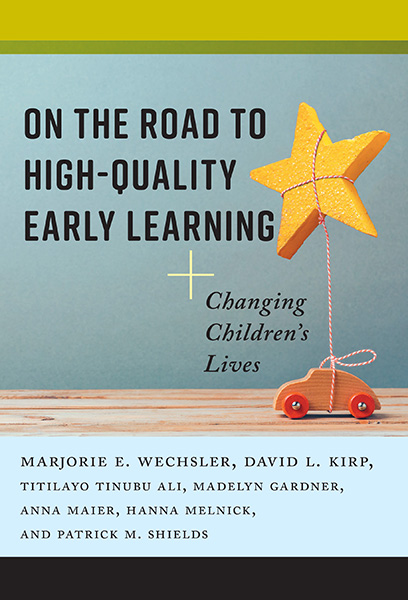Professors: Request an Exam Copy
Print copies available for US orders only. For orders outside the US, see our international distributors.
Marjorie E. Wechsler, David L. Kirp
With: Titilayo Tinubu Ali, Madelyn Gardner, Anna Maier, Hanna Melnick, Patrick M. Shields
Publication Date: June 22, 2018
Pages: 256

This timely book will help policymakers and practitioners convert their visions of high-quality early education into on-the-ground reality by providing a much-needed, richly detailed look at how states can design, fund, and manage exemplary programs. The authors describe and analyze how four states—Michigan, West Virginia, Washington, and North Carolina—have built early education systems that positively affect student outcomes. Sharing a commitment to advancing key elements of a quality preschool education, each of the states developed programs with different enrollment requirements, services, and oversight. All of them, however, rely on common overarching strategies, such as: establishing standards and supporting improvement, investing in knowledgeable educators, coordinating and aligning early education programs with elementary school, seeking sufficient funding sources and mechanisms, and building broad-based support. This book offers powerful lessons for anyone who is committed to delivering engaging, age-appropriate preschool programs for all.
Book Features:
Marjorie E. Wechsler is principal research manager at the Learning Policy Institute (founded by Linda Darling-Hammond) and co-leads the organization’s Early Childhood Learning team. David L. Kirp is a professor of the Graduate School at the University of California, Berkeley, a senior scholar at the Learning Policy Institute, and a contributing writer at The New York Times. Titilayo Tinubu Ali, Madelyn Gardner, Anna Maier, Hanna Melnick, and Patrick M. Shields are all with the Learning Policy Institute.
“…exemplary "must-read" for professionals in the field, highly recommended especially for public and college library collections.”
—Wisconsin Bookwatch, Midwest Book Review
"...this text will no doubt make a significant contribution to the field of child development and early childhood education." —Teachers College Record
"Making sure that young children get a good education during their earliest years has been my priority for 4 decades and was at the top of my to-do list when I was the governor of North Carolina. I have kept at it ever since, enlisting current and future governors and other state leaders in the cause. That's why this book is so valuable—it's a "how-to" for the current generation of political leaders, Republicans and Democrats alike, who want to develop early education policies and practices that work."
—James B. Hunt Jr., Governor of North Carolina, 1977-85, 1993-2001
"On the Road to High-Quality Early Learning provides critical insights for addressing the key challenge for preschool policy:fulfilling preschool's promise at scale."
—W. Steven Barnett, Board of Governors Professor and director of the National Institute for Early Education Research (NIEER) at Rutgers University
"The research has long been clear that when early childhood professionals have high-quality interactions with young children, those children enjoy immediate and long-term benefits. What’s much less clear is how states can go about maximizing the number of those high-quality interactions. This book is a great resource for everybody engaged in state-level processes on behalf of young children, providing valuable lessons from leading states to help other states chart their own path."
—Elliot Regenstein, Partner, Foresight Law + Policy
Tentative Table of Contents
Preface
Chapter 1. Introduction: Turning Smart Ideas Into On-the-Ground Reality
Early Childhood Education Matters
The Policy Imperative
Quality Counts
Getting Programs Off the Ground
Making Sure the Program Is Effective
Chapter 2. Michigan: Quality From the Start
State-Funded Preschool in a Nutshell
Politics of Early Education
Program Administration and Management
Getting to Quality
Next Steps for Michigan
Key Takeaways
Chapter 3. West Virginia: Pre-K for All
State-Funded Preschool in a Nutshell
Politics of Early Education
Program Administration and Management
Getting to Quality
Next Steps for West Virginia
Key Takeaways
Chapter 4. Washington State: Pre-K and Child Care for the Whole Child
State-Funded Early Education in a Nutshell
Politics of Early Education
Program Administration and Management
Getting to Quality
Next Steps for Washington
Key Takeaways
Chapter 5. North Carolina: Birth-to-Age-3 Leads the Way
State-Funded Early Education in a Nutshell
Politics of Early Education
Program Administration and Management
Getting to Quality
Next Steps for North Carolina
Key Takeaways
Chapter 6. Building High-Quality Programs: Lessons from the States
Prioritize Quality and Continuous Improvement
Invest in Training and Coaching
Coordinate the Administration of Birth-Through-Grade-3 Programs
Strategically Combine Multiple Funding Sources to Increase Access and Improve Quality
Create Broad-Based Coalitions and Support
Conclusion: Realizing the Potential of Early Education
Index
About the Authors
Download PDF Appendix: Additional Tables, Figures, and Methodology
Webinar co-sponsored by the Learning Policy Institute, Council of Chief State School Officers, National Association for the Education of Young Children, and the National Governors Association
Speakers:
David Kirp, Professor Emeritus of the Goldman School of Public Policy at the University of California, Berkeley, contributing writer to the New York Times, and Senior Fellow at the Learning Policy Institute
Marjorie Wechsler, Principal Research Manager at the Learning Policy Institute
Ross Hunter, Secretary of the Washington State Department of Children, Youth, and Families.
Monica DellaMea, Executive Director of the Office of Early and Elementary Learning at the West Virginia Department of Education.
Anna Mercer-McLean, Director of the Community School for People Under Six in North Carolina.
Professors: Request an Exam Copy
Print copies available for US orders only. For orders outside the US, see our international distributors.